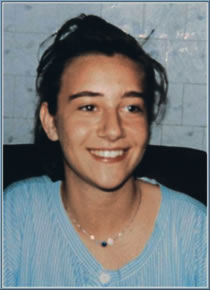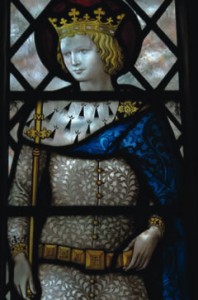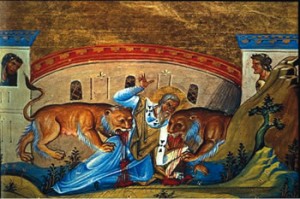October Saints
 Blessed Chiara Badano (1971-1990)
Blessed Chiara Badano (1971-1990)
Chiara Badano was, like Our Lady, an only child, much desired by her parents and greatly loved and treasured as a special gift from God.
She was born in 1971 in Sassello, northern Italy, and showed early signs of piety, exhibiting a deep love for God. She was of strong, but docile, character and radiated joy and kindness within her normal activity. She had many friends and loved sports, especially tennis, swimming and hiking. Initially she dreamed of being a flight attendant, and she enjoyed dancing and singing.
In 1981, Chiara discovered the Focolare movement through a friend who invited her to join. She had a close relationship with the foundress, Chiara Lubich, who gave her the name Luce (Light). At the age of 16, her ambition changed and she decided to pursue a consecrated life.
One day, at age 17, while playing tennis, the young woman felt an acute pain and returned home, causing her mother alarm at her unnatural pallor. When asked why she had come home, she explained, “Because during the match I felt such a sharp pain in my back that I dropped the racquet.” Gradually the pain became worse and she was diagnosed with a cancerous tumour in her shoulder. She began intense chemotherapy while she continued her daily life with the same joy and faith, once she had faced the struggle of saying ‘Yes’ to what Jesus was asking of her. This faith moved her to give all of her savings to a friend who was going to be a missionary in Africa.
Despite the efforts of her doctors, her illness progressed rapidly and after unsuccessful surgery she lost the use of her legs. “If I had to choose between walking or going to heaven, I’d choose heaven,” she told her family. In July 1989 she suffered severe haemorrhaging and her death appeared imminent. She told her parents, “Don’t cry for me. I am going to Jesus. At my funeral I don’t want people to cry, but rather to sing with all their voices.”
Chiara prepared her own funeral: the songs and readings for the Mass, the dress and hairdo. Everything was for her a celebration. She made one last exhortation to her mother: “When you dress me, you must repeat three times: Now Chiara is seeing Jesus.”
She died on October 7, 1990, surrounded by her parents and friends. Her final words were, “Ciao. Be happy because I am.”
Blessed Chiara, teach us to accept with joy whatever God sends us in life.
(Source: Internet – various)
 Saint Edward the Confessor
Saint Edward the Confessor
(1004-1066)
Born the son of King Ethelred in 1004, Edward succeeded to the English throne in 1042. He was gentle, generous, without ambition, given to much prayer and to hunting, and his kingdom had peace and good government under his rule.
Holy, but politically weak, Edward was largely overshadowed by Saxon lords on the political scene. Edward devoted his efforts to completing Westminster Abbey. Considered holy, just and fair, he was much loved by his English subjects and was known as ‘Good King Edward’.
He died, childless, in 1066 and supposedly named Harold to succeed him. However, this was challenged by William of Normandy, giving rise to war. Edward was buried in his beloved Westminster Abbey. He was canonised in 1161 and his relics were enshrined on October 13, 1162.
Saint Edward, obtain for us the grace to keep in touch with God throughout our day.
(Encyclopedia of the Saints, Matthew, Margaret & Stephen Bunson.1998 Our Sunday Visitor Publishing, Indiana)
 Saint Ignatius of Antioch (d. 107)
Saint Ignatius of Antioch (d. 107)
Ignatius, bishop of Antioch, called ‘the God-bearer’, was probably a disciple of St John the Evangelist. His principal claim to fame comes from his martyrdom. Arrested by Roman authorities, he was sent to Rome for execution and, in the company of several soldiers, set out on the road to the Eternal City.
Along the way, Ignatius composed epistles to the Christian communities of Ephesus, Magnesia, Tralles, Rome, Philadelphia, Smyrna, and a farewell letter to Bishop Polycarp. The letters of Ignatius have long been greatly honoured by the Church for their eloquent, detailed glimpses of the Church in Ignatius’ era, and Ignatius’ own spirituality.
He died being thrown to the wild beasts in the Roman Circus in 107.
Saint Ignatius, give us courage to face the wild beasts of our own day.
(Encyclopedia of the Saints, Matthew, Margaret & Stephen Bunson.1998 Our Sunday Visitor Publishing, Indiana)
 Entries(RSS)
Entries(RSS)